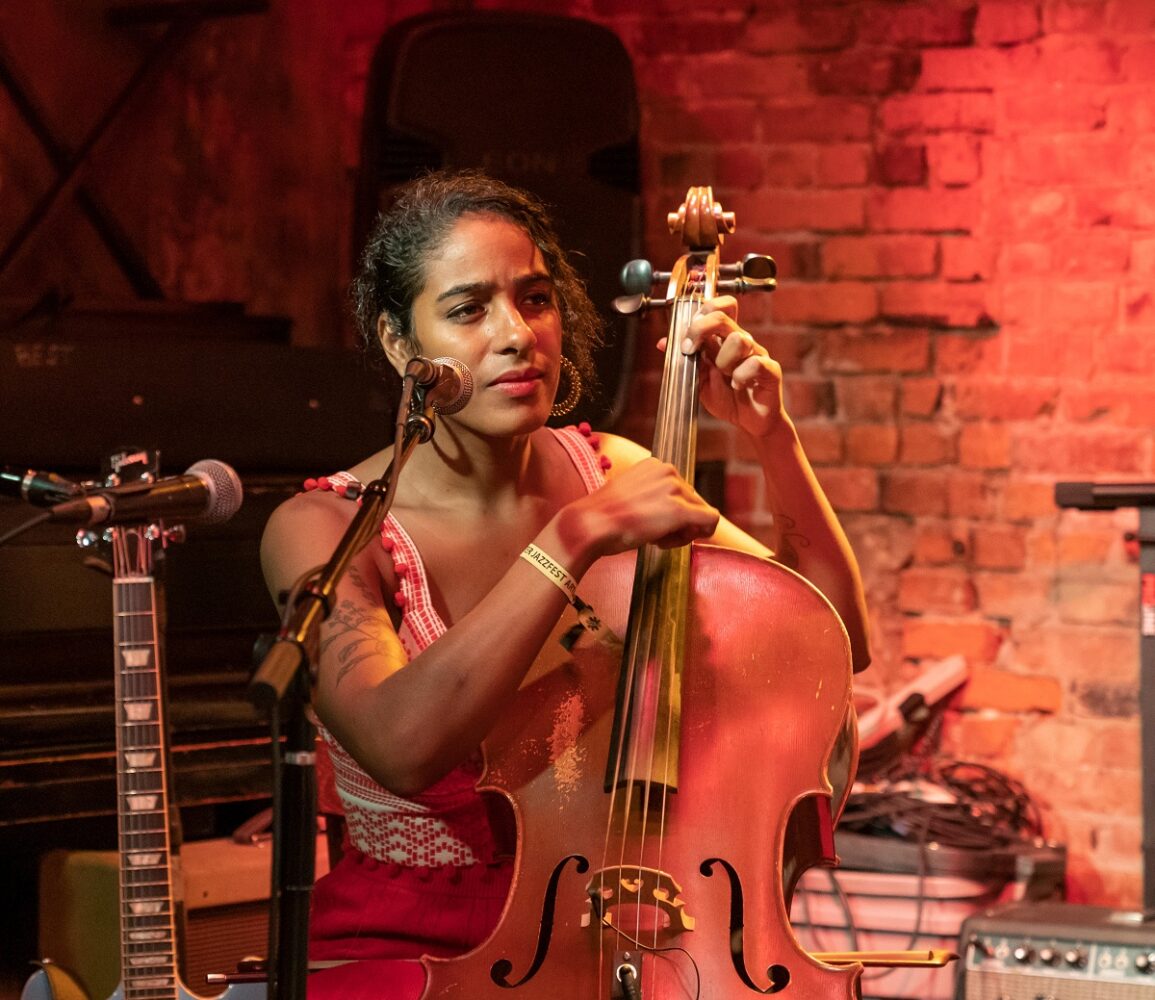Spring 2023
Eclectic Erudition
Two luminous, youthful musicians
Published: February 28, 2023
Last Updated: June 1, 2023

Photo by Lev Radin / Alamy Stock Photo
Leyla McCalla performs during Winter JazzFest at The Bitter End in New York City, January 6, 2019..
After busking on the streets of New Orleans, McCalla first garnered national attention—which has since increased exponentially—as a member of the erstwhile Carolina Chocolate Drops, in 2011. This Grammy Award–winning band celebrated the significant contributions that African Americans have made to traditional Appalachian music, as played on acoustic stringed instruments, primarily the banjo and fiddle. This once-obscure legacy, which dates to the eighteenth century, disproves the stereotypical, exclusionary, and negative notion that such sounds, which presaged commercial country, are solely Anglo-American in origin. The Carolina Chocolate Drops’ high-profile focus on this fact constituted a major multi-cultural revelation and a teachable moment.
McCalla’s solo projects have found her collaborating with musicians of all stripes from New Orleans, Lafayette, and beyond. Her worldview reflects a keen sense of social conscience and staunch political convictions. McCalla’s most recent album, Breaking the Thermometer (ANTI-), focuses on her ancestry and the saga of Radio Haiti, which, as ANTI- Records has explained, was “the first radio station to report the news in Haitian Kreyòl, the voice of the people—as well of the journalists who risked their lives to broadcast it for nearly 50 years.” As McCalla explained to music journalist Lynne Margolis of the online magazine The Bluegrass Situation, “New Orleans wouldn’t be what it is without the Haitian Revolution.” This rebellion sparked the emigration of some ten thousand Haitians to Louisiana between 1809 and 1810—when “Haiti [was] born out of this struggle to create an identity that was not about being a slave, that was about surviving slavery.”
Those who are unfamiliar with Leyla McCalla’s music might initially find Breaking the Thermometer dauntingly esoteric. The use of recorded excerpts from both a radio broadcast and a telephone conversation may be especially puzzling at first. But the beauty and palpable emotion of the songs on this album will quickly pull listeners in.
Kelli Jones is an in-demand and near-ubiquitous figure on the vibrant music scene in Lafayette, where a high bar for musicianship prevails. Jones adeptly plays guitar and fiddle in a spectrum of country and Cajun styles, tinged with elements of blues and swing. This versatility extends to mastery of complex and demanding tunes from Cajun tradition, some of which are rooted in medieval France. Renditions of these by Jones sometimes take the form of fiddle duets with the noted producer and multi-instrumentalist Joel Savoy.When singing in English, Jones often explores older styles of country, including songs by Moon Mullican, the Western-swing pianist who linked that genre to rockabilly via his acknowledged influence on Jerry Lee Lewis. In another vein, Jones has described herself as “melancholic madame meets musical merriment.” She has recorded a striking album of originals, entitled Queen of the In Between, that are intensely personal and plaintive, while also revealing her dry wit: “I’m the queen of the in between. You want an answer, well, don’t ask me . . . I indecisively reign supreme.” Queen of theIn Between is Jones’s most recent album, self-released under the name K. C. Jones, and available online. The aural settings for its often confessional lyrics encompass ’70s progressive country, retro soul, aggressive rock, and more, recalling the work of Emmylou Harris and Rosanne Cash.

Jones (left) with T’Monde bandmates Drew Simon and Megan Constantin. Photo by Jenny Lyons Simon.
Spirited Melancholy (Valcour)—a collaboration with the inventive guitarist Daniel Coolik—finds Jones exploring the loosely defined Great American Songbook. Recordings of the popular standards within this canon often utilize elaborate accompaniment by a big band or a full orchestra. In stark contrast, Jones and Coolik chose an uncluttered, less-is-more setting. Jones’s strong, clear-toned, deceptively simple phrasing—on oft-recorded songs such as “Where or When” and “Lullaby of the Leaves”—compares quite favorably to versions of them by the prominent jazz vocalist Ella Fitzgerald.
During the pandemic lockdown Jones recorded innovative interpretations of songs made famous by Whitney Houston, Elton John, John Prine, Mariah Carey, Cat Stevens, the Rolling Stones, and others, utilizing a full spectrum of accompaniments with no intent to mimic the original definitive versions. Collectively referred to as Covered 19, the songs can be heard via videos on Jones’s Facebook page. Music on internet platforms can suddenly disappear, though, and Facebook does not make these songs easy to find; performances of this caliber warrant a more accessible online format, and the high points among these covers merit release in some more substantial form.
Jones sings fluently in both contemporary French—on covers of ’60s pop by Françoise Hardy and Petula Clark—and Cajun French. She is a member of the Cajun bands T’Monde, The Daiquiri Queens, and Feufollet, which all meld reverence for tradition with fresh ideas plus the raison d’être of keeping dance floors full. And, accompanied on some songs—including archaic ballads—by singer Megan Brown Constantin, Jones joined in on the compilation I Wanna Sing Right: Rediscovering Lomax in the Evangeline Country (Valcour.) This modern-classic anthology celebrates the seminal Louisiana song-collecting field trips undertaken by folklorists John and Alan Lomax for the Library of Congress in 1934.
Genre-bending eclecticism can be problematic for musicians who may spread themselves too thin, with uneven results. But this pitfall seems unlikely given McCalla’s and Jones’s considerable accomplishments and excellent choices of material thus far. Their next projects are eagerly awaited.Ben Sandmel is a New Orleans–based writer, folklorist, and producer. The former drummer for the Grammy-nominated Cajun/country band The Hackberry Ramblers, Sandmel is also the author of Ernie K-Doe: The R&B Emperor of New Orleans. In May 2018, the LEH honored Sandmel with an award for his Lifetime Contributions to the Humanities. In August 2021, Sandmel graduated from Tulane University with an MA in musicology.
